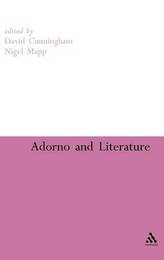
|
Adorno and Literature
Hardback
Main Details
| Title |
Adorno and Literature
|
| Authors and Contributors |
Edited by David Cunningham
|
|
Edited by Nigel Mapp
|
| Physical Properties |
| Format:Hardback | | Pages:224 | | Dimensions(mm): Height 234,Width 156 |
|
| Category/Genre | Literary theory
Western philosophy from c 1900 to now
Philosophy - aesthetics |
|---|
| ISBN/Barcode |
9780826487520
|
| Classifications | Dewey:801 |
|---|
| Audience | | Postgraduate, Research & Scholarly | | Professional & Vocational | |
|---|
|
Publishing Details |
| Publisher |
Bloomsbury Publishing PLC
|
| Imprint |
Continuum International Publishing Group Ltd.
|
| Publication Date |
8 June 2006 |
| Publication Country |
United Kingdom
|
Description
Despite the recent upsurge of interest in Theodor Adorno's work, his literary writings are generally under-represented. However, literature is a central element in his aesthetic theory. Bringing together original essays from a distinguished international group of contributors, this book offers a wide ranging account of the literary components of Adorno's thinking. It is divided into three sections, dealing with the concept of literature, with poetry, and with modernity and the novel respectively. At the same time, the book provides a clear sense of the unique qualities of Adorno's philosophy of literature by critically relating his work to a number of other influential theorists and theories including contemporary postmodernist theory and cultural studies.
Author Biography
David Cunningham is Principal Lecturer in English Literature at the University of Westminster and an editor of the journal Radical Philosophy. Nigel Mapp is Lecturer in English at the University of Tampere, Finland.
Reviewsmention- The Chronicle of Higher Education/ October 20, 2006 'This elegant and finely argued collection of essays...sends the reader back to the Notes to Literature, in particular, with a sharpened appetite...' 'In a series of scrupulous readings of Adorno's reflections on literature, which have been noticeably neglected in the recent reconsideration of his thought among anglophone scholars, they communicate the sophistication of his criticism and its own critical and utopian potential for literary studies. ' Radical Philosophy, 2007
|